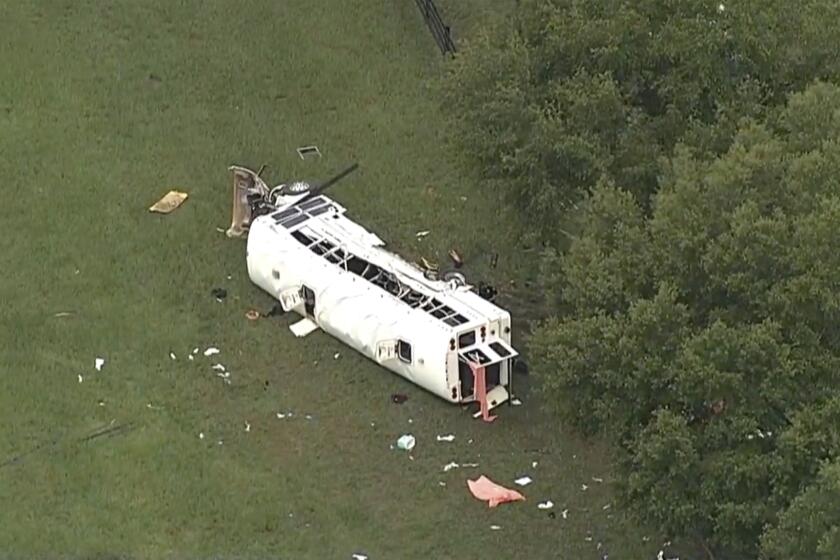Keeping U.S. Options Open Is Safest Strategy in Strait : Taiwan: To deter China from using force, maintain weapons support and don’t rule out a U.S. response to an attack.
China’s military maneuvers and threats against Taiwan are bolstering support for the island among U.S. lawmakers. Many are surprised to learn that the legislation that guides official policy toward Taiwan is not a treaty. Having grasped that an American response to hostilities is not guaranteed, some want to scrap the policy of “strategic ambiguity” and protect Taipei by “clarifying” Washington’s position. Would this be wise?
American policy toward Taiwan’s security is principally outlined in the Taiwan Relations Act of 1979. According to Section 2 of the law, it is the policy of the United States “to consider any attempt to resolve the Taiwan issue by other than peaceful means, including boycotts or embargoes, a threat to the peace and security of the Western Pacific area and of grave concern to the United States.”
In terms of American arms sales to Taiwan, the law clearly states that it is U.S. policy to provide Taiwan with weapons necessary for its security and an adequate defensive capability, and that the quality and quantity of these weapons will be determined by the President and Congress after consultation with U.S. military authorities.
In keeping with the provisions of this law, the U.S. has sold a wide variety of defensive military equipment to Taiwan. Recent weapons deliveries include AWACS early warning aircraft, M60A3 tanks, Knox-class destroyers, Harpoon antiship missiles and antisubmarine warfare helicopters. F-16 fighter aircraft and a derivative of the Patriot missile air defense system are slated for delivery. The Clinton administration also has dispatched two carrier battle groups to patrol the waters around Taiwan, and it has warned Beijing that any attack directed against the island will not be tolerated and “could” lead to an American military response. Finally, on Tuesday, the House overwhelmingly passed a nonbinding resolution calling on the U.S. to ‘assist in defending’ Taiwan if it comes under attack. Thursday, the Senate passed one deploring the military exercises and urging the president to consult with Congress on an “appropriate” response should those exercises pose an actual threat to Taiwan. But is the U.S. committed to fight to protect Taiwan?
The Taiwan Relations Act provides the U.S. only with an option to defend Taiwan; it does not necessarily commit the U.S. to Taiwan’s defense. The difference is important. The act is not a mutual defense treaty, and unlike America’s existing security relationships with Korea or Japan, a U.S. response to hostilities directed against Taiwan is not guaranteed. Perhaps no one has underscored this fact more than Lee Teng-hui, Taiwan’s president, who often warns the island republic that it must maintain the capability and strength to handle an attack on its own.
Some now claim that the law’s ambiguity may encourage Beijing to use force against Taiwan. They are pressuring the Clinton administration to make clear its intentions lest Beijing “miscalculate” and attack.
Recent criticisms of American policy do have merit. But the present policy holds numerous advantages for the U.S. One benefit is that it allows for some flexibility that might otherwise be lost; options remain open. For example, a U.S. response to an attack directed against Taiwan is not guaranteed but neither is it ruled out. The lingering possibility of an American response helps to deter China from exercising its military option. The policy also enables Washington to establish a linkage between U.S. policy and the policies and actions of other states.
If China were to announce that it had completely ruled out the use of force in any attempt to seek reunification with Taiwan, the U.S. might accordingly reduce its security commitment to Taipei. If, however, Beijing continues to threaten the island, the U.S. might strengthen its military support for Taiwan. Finally, and perhaps most important, the current policy encourages reckless elements on both sides of the Taiwan Strait--the militarists in Beijing and the separatists in Taipei--to behave responsibly. The uncertainties associated with an American response to hostilities may lead extremists in both camps to act with restraint.
Rather than call for a revision of the Taiwan Relations Act, the White House should be encouraged to use it. The delivery of the F-16 warplanes and the Patriot missile air defense system could be expedited. Weapons systems previously denied to Taiwan might now be approved. In fact, there is a wide spectrum of options available, ranging from economic sanctions to direct American military assistance.
American security policy toward Taiwan is not a perfect policy, but all alternatives could undermine American interests. A termination of military support could destabilize the Asia-Pacific region. But a “clarified” or “strengthened” policy would limit U.S. options and maneuverability. It also could provoke a hostile Chinese response. For these reasons, the U.S. should continue to pursue its present policy on military support for Taiwan.
More to Read
Start your day right
Sign up for Essential California for news, features and recommendations from the L.A. Times and beyond in your inbox six days a week.
You may occasionally receive promotional content from the Los Angeles Times.






